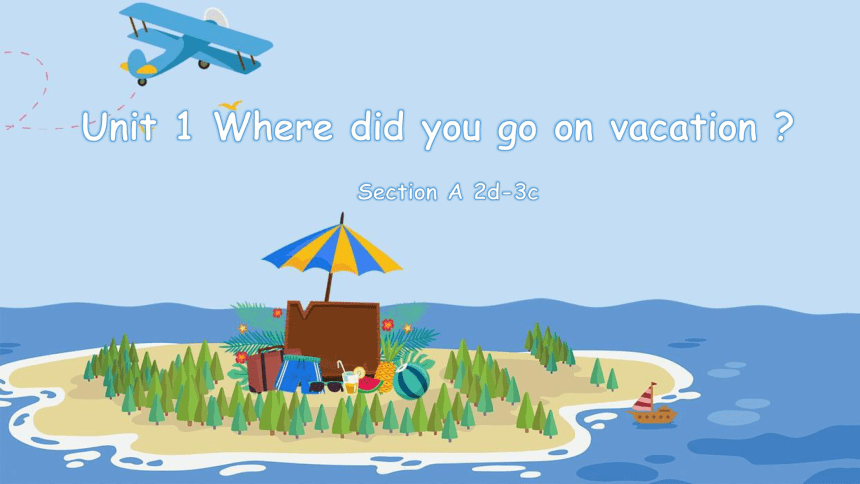(
课件网) Unit 1 Where did you go on vacation Section A 2d-3c Where did Helen go on vacation 2d Listen to the conversation and answer the questions. 1.When was Helen on vacation 2.Where did Helen go 3. Did Helen take photos there 4. Did Rick do anything special last month What did he do Last month. She went to Guizhou. Yes, she did. No, he didn’t. He just stayed at home most of the time to read and relax. 好久不见 形容词修饰不定代词要后置 adj.精彩的,极好的 相当多的 大部分时间 2d Read the conversation and underline the language points. Role-play the conversation. Rick: Hi, Helen._____. Helen: Hi, Rick. Yes, I was _____ last month. Rick: Oh, did you go _____ Helen: Yes, I went to Guizhou _____. Rick: Wow! Did you see_____ Helen: Yes, I did. It was wonderful! We took_____there. What about you Did you do _____ last month Rick: Not really. I just _____ most of the time _____. Long time no see on vacation anywhere interesting with my family Huangguoshu Waterfall quiet a few photos anything special stayed at home to read and relax 2d 1. Long time no see. 好久不见 这是一句典型的被英语接纳了的中式英语句子,并在英语母语国家广为使用。长期以来,汉语不断有词汇被英语吸纳,以外来词的身份进入英语语言,如:tofu(豆腐)、mahjong(麻将)、typhoon(台风)、tai chi(太极)、jiaozi( 饺子)、putonghua(普通话),还有中西合璧的wan ton soup(馄饨)、taikonnaut( 中国航天员)等等。 但是,这并不意味着我们放任或迎合中式英语,随意创造中式英语。对大家简单依据网络线索,不假思索、考证便相互传诵的诸如Good good study, day day up(好好学习,天天向上); people mountain people sea(人山人海)等。我们应注意加以反思,以免以讹传讹! Language points anywhere作副词,“在任何地方”。 interesting是形容词,作后置定语修饰anywhere。 当形容词修饰含有some-,any-,every- + where或不定代词构成的复合词时,要把形容词后置作定语。 例: I have something important to tell you. 我有些重要事情告诉你。 2. Did you go anywhere interesting — Where would you like to visit — I'd like to go _____. A. relaxing somewhere B. somewhere relaxing C. relaxing anywhere B (1) take photos / pictures / a photo / a picture 拍照;照相 take photos of sb./sth. 给某人、某物拍照 photos前面可用some/ many/ lots of等修饰。 例:我可以为你们拍一张全家福吗? May I take a picture /photo of your family 3. We took quite a few photos there. (2) quite a few “相当多”,修饰可数名词,相当于many。 quite a little “许多;相当多”,修饰不可数名词,相当于much。 修饰复数名词 修饰不可数名词 — Is your friend still in Australia? — I don't know . I have_____ information about him because we haven't seen each other for _____ years. A. a little ; a few B. little ; a few C. a few ; a little D. few ; a little a few: 有几个 few: 几乎没有 (肯定意义) (否定意义) a little: 有点儿 little: 几乎没有 (肯定意义) (否定意义) B most of the time “大部分时间”,在此作时间状语。 most of the后接可数名词或不可数名词,表示“大部分…”。 to read and relax 是动词不定式短语,做目的状语修饰stayed 4. I just stayed at home most ... ...

